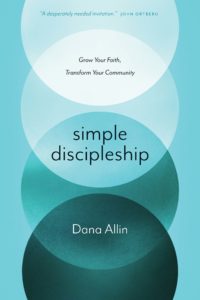Have you ever felt completely in over your head when asked to mentor or disciple another person?
When I’ve asked people to do this, they have looked at me as if I were asking them to solve global warming! Their fear came from believing that they needed to be biblical experts and almost perfect disciples themselves to invest in others. While knowledge and maturity are nice to have, assuming they are requirements can be detrimental to our disciple-making culture.
Why do I say this? Because assuming you need to be an expert reinforces a false view of discipleship—the idea that the best way to help people grow is by transferring knowledge from one person to another.
Good news! You don't have to be an expert to help someone grow in faith and maturity. God wants to use you as today. Share on XIf we rely on that understanding of discipleship, we will fail to produce true maturity. We will also have few people willing to help others grow in their discipleship, because most assume they don’t have the knowledge or maturity.
How, then, can a non-expert and perhaps even a new disciple help another person grow in faith? Three things are crucial.
First, the primary passion of the disciple maker must be the growth and development of the person they are helping.
This seems like a no-brainer, but how many times have you seen someone who was more interested in showing their knowledge than helping another person flourish? I have seen this, and perhaps done this, more than I would like to admit. How refreshing it is when a disciple maker deeply cares about the individual and wants to hear their story and how God has worked in their life. You don’t have to be an expert to care about someone, and sometimes being an expert leads you to focus more on your expertise than on the person you’re helping.
As Paul wrote in 1 Corinthians 8:1-3, “We know that ‘all of us possess knowledge.’ This ‘knowledge’ puffs up, but love builds up. If anyone imagines that he knows something, he does not yet know as he ought to know. But if anyone loves God, he is known by God.”
Second, the disciple maker needs to know what it means to be a disciple.
So there is a little bit of knowledge required, but not necessarily expertise in a particular area.
A person who is good at helping others grow will have an idea of what a mature disciple looks like, and of course they should be on the same journey too. There are many books (mine included) on the qualities that Jesus desires in a disciple, but one great way to get a handle on this is to read the Scriptures, especially the Gospels, looking for the characteristics that God desires in His followers. I remember in college going through my Bible with colored pencils and using one color to mark every direct or indirect reference to the nature of a disciple. It was great to have these Scriptures to paint a picture of a disciple.
Those investing in others need to have at least a general sense of what a disciple should know in their mind, what should be true of their heart and relationship with others, and what they should do as a follower of Jesus.
Third, the disciple maker should ask questions of the emerging disciple.
When you have a lot of knowledge, you are tempted to be more directive in working with others. However, the best way for a person to grow is to be responsible for their own growth and develop their own action plan. People are much more likely to implement a plan they create rather than a prepackaged plan that is given to them. So a disciple maker needs to ask questions about where the disciple thinks they need to grow and what action steps they can commit to taking in order to grow in that area.
I have used these three ideas to train people to invest in the maturity of others. When I go through these principles with them, I see the panic on their faces dissipate and be replaced with excitement that they get to partner with God in helping others grow. I hope you can find ways to integrate these concepts into your life and ministry and see an exponential movement of the Lord.
Read more about how to grow your faith and strengthen your community in Simple Discipleship: Grow Your Faith, Transform Your Community by Dana Allin.
- Why You Don’t Need to Be an Expert to Disciple People - January 8, 2019

